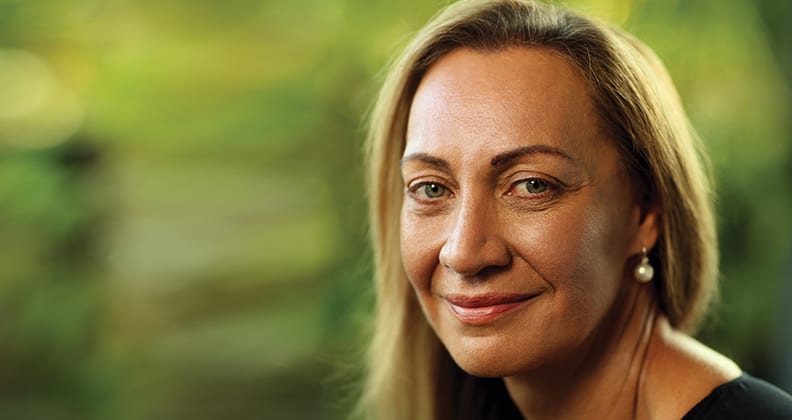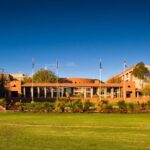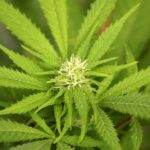The suicide rates of Indigenous people in Western Australia are shockingly high. In the vast and rugged Kimberley alone, the suicide rate of Indigenous people is 74 per a population of 100,000 – higher than in developing countries such as Guyana, Sri Lanka or Suriname. It’s something that 2018 Curtin Lifetime Achievement Award winner, Njamal woman Dr Tracy Westerman, is determined to change.
“I think there is great intent on behalf of most Australians to do better. The problem is that we are really invisible to most Australians,” Westerman says.
“Reconciliation Australia has shown that only 30 per cent of non-Aboriginal people regularly socialise with Aboriginal Australians. We are three per cent of the population and most Australians get their information about Aboriginal people from the media, rather than through direct, personal contact.
“The stakes are too high to get it wrong when we have suicide rates as high as they are and clinicians struggle everyday with working in a culturally safe manner.”
A unique psychological service
A proud Njamal woman from the Pilbara, Dr Westerman has worked for more than two decades to reduce the high rates of mental illness and suicide among Aboriginal people.
In 1998, after completing her undergraduate studies, she founded the Indigenous Psychological Services to help Aboriginal people and make a difference to vulnerable Indigenous communities in the absence of government funding.
“It was really born out of frustration. Psychology is a very mono-cultural discipline. Aboriginal people were not part of the evidence base that helped determine terms of assessment, treatments of best practice and even the basic tenets of client engagement,” Westerman says.
Appropriate Indigenous tests
Westerman became the first Aboriginal person in the country to complete a combined masters and PhD in clinical psychology, in 2003, after completing her postgraduate studies at Curtin.
During her studies, she developed psychometric tests and assessment protocols that are considered firsts for Indigenous peoples worldwide. This includes the Westerman Aboriginal Symptom Checklist – Youth (WASC-Y), which is designed to identify Aboriginal youth at risk of depression, suicidal behaviours, drug and alcohol use, impulsivity and anxiety, and determine the moderating impacts of cultural resilience on risk.
A Canadian delegation came to Australia to explore Westerman’s work in 2005 and included references to WASC-Y in their final report to the Health Canada First Nations Inuit and Health Branch, which recommended new Aboriginal youth suicide prevention strategies. The report noted WASC-Y “… has many features to improve cultural sensitivity, including use of culturally appropriate language, items based on common cultural idioms of distress, efforts to reduce the stigma of giving positive responses, and a response scale appropriate for children indicating severity”.
“This had never occurred before in the sense that often people adapt an existing tool, whereas we were interested in ‘ground up’ development of triggers for major issues such as depression and suicide,” Westerman says.
“After 20 years of gathering pretty solid population data, we have been able to design whole-of-community targeted intervention programs, which we have been able to roll out to some of our highest risk communities.”
Drive and perseverance
As a child, Westerman was influenced by her parents’ perseverance, hard work and optimism, which would help shape the strong moral compass that would define her career and her life.
She heard stories of her mother, Mavis, being required to apply for citizenship in her own country and prove that she had “adopted the manner and habits of civilised life”, because the law did not automatically grant citizenship to Aboriginal Australians until the 1967 referendum.
And she watched as her father, Mick, a white man, refused to accept his full wages as a station ringer when he noticed that his Aboriginal workmates were being underpaid.
“I was incredibly lucky that my parents modelled optimism, despite coming from a reasonable amount of disadvantage. Giving back and being thankful were part of the values that they lived and instilled for my siblings and I,” she says.
Recognition
Since founding the Indigenous Psychological Services, Westerman has trained more than 24,000 clinicians in culturally-appropriate psychological approaches, enabling them to reach many more thousands of Aboriginal people at risk. She has delivered numerous national and international keynote addresses, and acted as an expert witness in many parliamentary enquiries.
She has been inundated with awards, including 2018 Australian of the Year (WA) and inducted into the 2018 WA Women’s Hall of Fame.
On 25 October, Westerman was named the Lifetime Achievement Award winner at the 2018 Curtin University Alumni Achievement Awards, in recognition of her exceptional contributions to her field of endeavour and to the greater community.
“I would like to express my gratitude to the Curtin alumni community for this acknowledgment of my body of work. I am conscious of the number of incredible individuals I was running against, so I definitely don’t take it for granted on any level!” she says.
In support of the next generation
Westerman is working with Curtin to launch a unique scholarship program for Indigenous students to study psychology, through which she will personally donate $10,000 per year, over five years, totalling $50,000.
“The Dr Tracy Westerman Aboriginal Psychology Scholarship Program will aim to foster the development of the next generation of clinicians committed to researching and delivering evidence-based, best practice into our high-risk communities,” Westerman says.
“My vision is to support students with remote and rural connections through their university studies with the aim of becoming Aboriginal psychologists skilled in Indigenous-specific mental health and suicide prevention and intervention programs.
“That is the true method upon which we are going to close the gap.”



